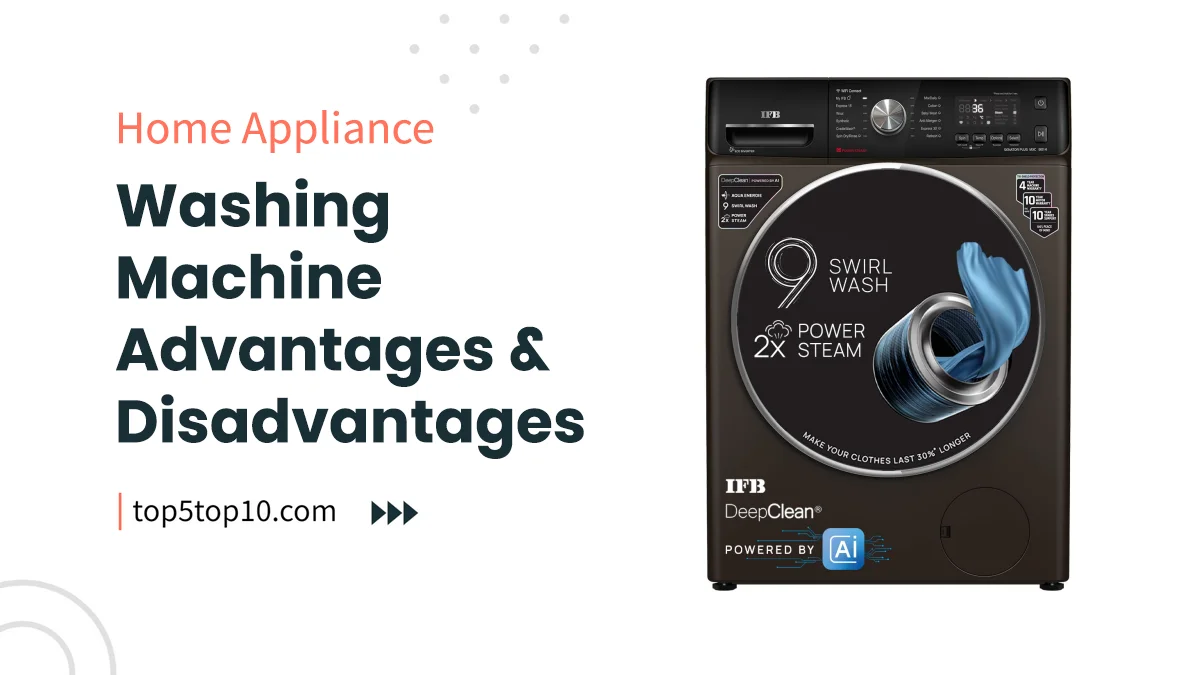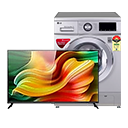
Advantages and Disadvantages of Washing Machine – Washing machines have become a household staple, revolutionizing the way we do laundry.
They offer convenience, efficiency, and time savings, but they also come with their own set of drawbacks.
In this comprehensive guide, we’ll explore the advantages and disadvantages of washing machines, helping you make an informed decision about whether this modern appliance is right for your home.
Contents
1. Advantages of Washing Machines
1.1 Time and Effort Savings
Washing machines automate the labor-intensive process of laundry, making it significantly faster and less physically demanding.
Instead of spending hours scrubbing clothes by hand, you can load the machine, press a few buttons, and attend to other tasks while the machine takes care of the laundry.
This time-saving aspect is particularly beneficial for busy individuals and families with hectic schedules.
1.2 Water and Energy Efficiency
Modern washing machines are designed with water and energy efficiency in mind.
They use advanced technologies such as sensors and load detection to optimize water usage and energy consumption.
High-efficiency machines can clean clothes effectively while using significantly less water and electricity than older models.
This not only benefits the environment but also leads to cost savings on utility bills over time.
1.3 Improved Cleaning Performance
Washing machines offer superior cleaning performance compared to manual washing.
They use a combination of agitators, drum rotations, and water jets to remove dirt and stains effectively.
Additionally, many machines come with various wash cycles and settings, allowing you to tailor the cleaning process to the type of fabric and level of soiling.
This versatility ensures that your clothes come out cleaner and fresher.
1.4 Convenience and Multitasking
One of the most significant advantages of washing machines is the convenience they offer.
You can load the machine and set it to start at a convenient time, allowing you to multitask or even run errands while the laundry is being done.
Delayed start and timer features make it easy to coordinate laundry with your daily routine, ensuring that you always have clean clothes ready when needed.
1.5 Accessibility and Inclusivity
Washing machines are designed to be accessible to a wide range of users, including individuals with physical limitations.
Many models come with user-friendly controls, easy-to-reach door openings, and adjustable settings.
For people with disabilities, some machines even feature Braille instructions or voice-assisted controls.
This inclusivity ensures that more people can benefit from the convenience of washing machines.
2. Disadvantages of Washing Machines
2.1 Initial Cost
While washing machines provide long-term cost savings, the initial investment can be substantial.
High-quality machines with advanced features may come with a higher price tag.
However, it’s essential to consider this cost in the context of the appliance’s lifespan and ongoing savings in time, effort, and utility bills.
2.2 Maintenance and Repairs
Washing machines require regular maintenance to ensure optimal performance and longevity.
Neglecting maintenance can lead to issues such as mold growth, clogged filters, and malfunctioning components.
In addition to maintenance, there is the possibility of repairs, which can incur additional expenses.
It’s essential to factor in the costs of maintenance and potential repairs when owning a washing machine.
2.3 Water and Energy Consumption
Despite their efficiency improvements, washing machines still consume water and energy.
In regions with water shortages, the use of water for laundry can be a concern.
Energy consumption can also be a consideration, particularly in areas where electricity is expensive or produced using non-renewable sources.
To mitigate these concerns, it’s essential to choose an energy-efficient machine and follow best practices for laundry.
2.4 Noise and Vibration
Washing machines, especially during spinning cycles, can generate noise and vibrations that may disrupt household activities or disturb occupants in adjacent rooms.
While modern machines are designed to be quieter, it’s advisable to consider noise levels when selecting a machine.
Placing the machine on a stable surface or using anti-vibration pads can help minimize these disturbances.
2.5 Space Requirements
Another consideration is the space required to accommodate a washing machine.
In smaller homes or apartments, finding adequate space for the appliance can be a challenge.
Some homes may lack dedicated laundry rooms, necessitating creative solutions such as placing the machine in a kitchen or bathroom.
Compact and stackable washing machines are available to address space constraints.
3. Comparison Table
Here’s a comparison table summarizing the advantages and disadvantages of washing machines:
| Aspect | Advantages | Disadvantages |
|---|---|---|
| Time and Effort | Saves time and effort | Initial cost |
| Water and Energy | Efficient water and energy use | Maintenance and repairs |
| Improved Cleaning | Effective cleaning | Water and energy consumption |
| Convenience | Convenient and multitasking | Noise and vibration |
| Accessibility | Inclusivity for various users | Space requirements |
4. Tips for Maximizing Washing Machine Benefits
To make the most of the advantages and mitigate the disadvantages of washing machines, consider the following tips:
- Choose Wisely: Select a washing machine that aligns with your needs and budget. Assess the machine’s features, energy efficiency rating, and water-saving capabilities.
- Regular Maintenance: Follow the manufacturer’s guidelines for maintenance, including cleaning filters, hoses, and the drum. This will ensure smooth operation and prevent issues.
- Energy and Water Efficiency: Opt for high-efficiency models that are ENERGY STAR certified and use less water per load. Follow recommended laundry loads to maximize efficiency.
- Noise Reduction: If noise is a concern, look for machines with noise-reduction features or place the machine on a stable surface. Anti-vibration pads can help reduce vibrations.
- Space Optimization: If space is limited, consider compact or stackable washing machine options. Explore creative placement solutions to maximize available space.
Conclusion
Washing machines have revolutionized the way we approach laundry, offering numerous advantages in terms of time savings, efficiency, and convenience.
However, it’s essential to be aware of the associated disadvantages, such as initial costs, maintenance requirements, and environmental considerations.
By understanding both the pros and cons, you can make an informed decision about whether a washing machine is a valuable addition to your household.
In conclusion, washing machines have reshaped how we manage laundry, making it more accessible and efficient than ever before.
Whether you choose to invest in one depends on your specific needs, budget, and willingness to address associated challenges.
Making informed decisions ensures that you can enjoy the benefits of this modern appliance while effectively managing its drawbacks.
5 Best Washing Machine Brands
| Washing Machine Brands | Best Price in India |
|---|---|
| IFB Washing Machine | Buy on Amazon |
| Samsung Washing Machine | Buy on Amazon |
| Whirlpool Washing Machine | Buy on Amazon |
| LG Washing Machine | Buy on Amazon |
| Panasonic Washing Machine | Buy on Amazon |
10 Best Washing Machine List 2023
Advantages and Disadvantages of Washing Machine FAQs
What are the advantages of using a washing machine?
The advantages of using a washing machine include:
- Time-Saving: Washing machines are much faster at cleaning clothes than hand washing, which saves time and effort.
- Convenience: You can load your laundry and let the machine do the work, giving you more free time.
- Better Cleaning: Washing machines use various washing programs and agitators to clean clothes more thoroughly than hand washing.
- Water Efficiency: Modern washing machines are designed to be water-efficient, using less water than traditional hand washing methods.
- Energy Efficiency: Energy-efficient models save on electricity costs and reduce environmental impact.
What are the disadvantages of using a washing machine?
The disadvantages of using a washing machine include:
- Initial Cost: Washing machines can be expensive to purchase initially, and high-end models with advanced features can be particularly costly.
- Maintenance: Washing machines may require periodic maintenance and repairs, adding to the cost of ownership.
- Space Requirements: You need sufficient space in your home for a washing machine, which may not be suitable for small living spaces.
- Noise and Vibration: Washing machines can be noisy and may cause vibrations, which can be disruptive in quiet environments.
- Dependency on Electricity: Using a washing machine relies on a continuous supply of electricity, which may not be available in some situations.
Are front-loading or top-loading washing machines better?
The choice between front-loading and top-loading washing machines depends on your preferences and needs.
Front-loading machines are generally more water and energy-efficient, provide better cleaning performance, and are stackable. Top-loading machines are typically more affordable, have faster wash cycles, and allow you to add forgotten items during a wash.
Consider your priorities and available space when making a selection.
Can washing machines damage delicate clothing?
Washing machines can potentially damage delicate clothing if not handled properly.
To protect delicate items, use a gentle or delicate cycle, place them in a laundry bag, and avoid overloading the machine.
Reading care labels and separating delicate items from heavy or abrasive materials can help prevent damage.
Can washing machines use too much water?
Older washing machines, especially top-loading models, tend to use more water compared to modern, water-efficient machines.
However, many modern washing machines are designed to be water-efficient and use sensors to determine the appropriate amount of water for each load, reducing water consumption.
It's important to select a water-efficient model to minimize water usage.
|
Related Tags
disadvantages of washing machine in points, Advantages and disadvantages of washing machines wikipedia, Advantages and disadvantages of washing machines pdf, Advantages and disadvantages of washing machines in india, Advantages and disadvantages of washing machines for students, disadvantages of washing machine wikipedia, 5 advantages of washing machine, benefits of washing machine with dryer
Last update on 2024-05-12 at 10:07 / Affiliate links / Images from Amazon Product Advertising API





















